CGS Student International Research Funding Awards: Fall 2024
Published January 10, 2025
Fifteen UW students were awarded funding during the CGS International Research Funding fall 2024 cycle. Funding is provided by the Center for Global Studies through a number of funds, including the Centennial Fund, the CGS Excellence Fund, the Ellbogen Fund, and the Harris Fund.
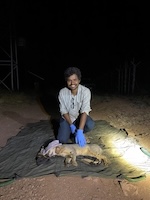
Kathan Bandyopadhyay
Kathan Bandyopadhyay
"Mesocarnivore in the dark: deciphering India’s small carnivore guild"
This project investigates the ecology and conservation of meso-carnivores in the central Indian landscape, focusing on jungle cats (Felis chaus) and rusty-spotted cats (Prionailurus rubiginosus). These small carnivores play critical roles in regulating prey populations and maintaining ecosystem balance, yet they are understudied compared to larger predators. The study will be conducted in Kuno National Park and Gandhi-Sagar Wildlife Sanctuary, two ecologically significant areas in Madhya Pradesh, India. Using a combination of camera traps, GPS collars, and field surveys, the research aims to estimate population densities, understand space-use patterns, and assess interactions with apex predators like leopards and human communities. This project will provide essential insights into how these species adapt to habitat fragmentation and human disturbance, informing more effective conservation strategies. The findings will support long-term coexistence initiatives between wildlife and human populations in this rapidly changing landscape.
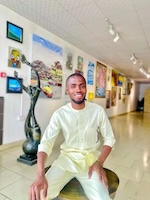
Ewalefoh Ernest Osemobho
Ewalefoh Ernest Osemobho
“The Role of Fashion in Shaping Afropolitan Identity Among the African Diaspora”
This work will examine how fashion shapes Afropolitan identity within the African diaspora. It will discuss how African textiles like Ankara, Aso Oke, and Adire blend African heritage with Western styles. Theories on postcolonialism, especially Homi Bhabha’s concept of hybridity, will be used to analyzes how the African diaspora navigates identity through fashion. The methodology would include fieldwork in Nigeria, where textile markets, designers, and influencers will be interviewed to understand the integration of traditional fabrics into contemporary styles. The scope of the study covers generational differences in fashion preferences and the impact of cultural appropriation by Western fashion houses. Targeted at scholars and students in cultural studies, fashion theory, and postcolonial studies, the research sees the role of fashion as a medium for cultural expression and identity-building. The findings aim to contribute to discussions on Afropolitanism, showing how fashion bridges African heritage and global influence in the 21st century.

Beatrice Bugos
Beatrice Bugos
“Fossil and modern tropical dry forest response to disturbance in elevated global temperatures”
Global warming drives more extreme weather events that greatly disturb forests. By 2140, >50% of Earth’s surface will warm to reach the Early Eocene Climatic Optimum (EECO, 51–53 Ma), a hot, equitable, and ice-free world. To make predictions about the future, we must start by establishing plant response to disturbance with modern analog forests. The effects of disturbance on plant diversity, insect damage diversity, leaf morphology, and plant physiology are well studied in modern literature and are shown to change through stages of recovery after disturbance. My research will investigate plant structure, leaf margin, plant diversity, and insect damage diversity as indicators for recovery stage of modern analog forests to Wyoming EECO fossil forests. I will study dispersed leaf cuticle and leaf litter at Parque Nacional Santa Rosa, Costa Rica–a modern analog to Wyoming EECO fossil forests–to establish a modern dataset and make fossil record comparisons.

Abdul Ansari
Abdul Ansari
“Assessing Climate Change Impacts to Tigers, Prey and its Habitats in Chitwan-Parsa Complex of Nepal’s Terai Arc Landscape (TAL)”
The purpose of this research is to conduct an empirical assessment on the impacts of climate change on tigers, prey and its habitat in Chitwan-Parsa complex of Nepal’s terai arc landscape (TAL). Many studies on tiger ecology have been conducted since the 1970s (Seidensticker 2008; Sunquist 1981). However, empirical studies on the said title have not been done yet. Nepal is one of the most negatively impacted countries because of climate change and there is an urgent need of such research. Given research priorities and data deficiency, I plan to understand the tiger population dynamics, demographic parameters, distribution, habitat distribution, tiger-prey distribution. I propose installing camera traps as per map grids in my research site. This is needed to understand tiger movement in the landscape and prey base captures and how changing land use and land cover, climate change is impacting tiger population and its prey as well as habitats.
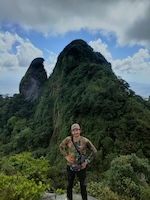
Michael Dayhan Castano Diaz
Michael Dayhan Castano Diaz
“Do ant-following birds use olfactory cues to find army ants' bivouacs (nests)?”
This research addresses the contentious debate surrounding birds' olfactory abilities, proposing that certain Neotropical birds, particularly those following army ants, may possess a heightened olfactory sense. By focusing on the army-ant following system in the tropical forest of La Soberanía Natural Park, Panama, this study will evaluate whether these birds use volatile chemical compounds (VCCs) produced by the ants to track and locate swarms. Using VCCs collected at army ant bivouacs (nests), this study will conduct a controlled experiment to test if birds of different levels of dependency on army ants have different olfactory abilities. This study not only contributes to understanding olfactory abilities in birds but also explores the dynamics of complex interactions in tropical ecosystems. It aims to foster interdisciplinary collaborations with chemistry and biology scientists from different countries, bridging the gap between the scientific community and Hispanic and English-speaking communities, and strengthen our knowledge about tropical forests.
Ransford Tege
Ransford Tege
“Oil and gas development and local livelihoods: a critical analysis of the national petroleum hub project in Ghana”
Despite the positive economic impacts of the commercial extraction of crude oil for the national government in Ghana since 2010, host communities at the sites of extraction continue to struggle with poverty, disruptions to Indigenous livelihoods, unemployment, and environmental contamination. The establishment of the “petroleum hub project” in Ghana’s western region is an attempt to ensure that positive impacts of increasing development are felt at the local and national levels—but whether or not this project can avoid the pitfalls of similar projects elsewhere in the region is an open question. This study aims to assess the current impacts of the project related to land ownership dynamics, socioeconomic effects, and livelihood changes—all important measures of development at the local level. Taking an exploratory case study approach, I will employ qualitative data collection methods including semi-structured interviews, participant observation, and document analysis. This research will contribute to geographic scholarship on the complex relationship between national development and local communities' welfare in the context of petroleum development. Findings will be published in my thesis and one peer-reviewed paper and will be shared with the Ghana national petroleum corporation.
Ajay Karki
Ajay Karki
“Human-big carnivore co-existence in Nepal”
Nepal has nearly tripled its tiger population from 121 in 2010 to 355, fulfilling its commitment to double the population by 2022. This remarkable growth has several social and ecological implications. This study aims to investigate the: (i) ecological interaction (among the tigers, among the leopards, and between the tigers and leopards); (ii) negative impacts on humans resulting from such interaction; (iii) effects of development activities such as roads and infrastructures on the ecology of these species; and (iv) reciprocal interaction of tigers and leopards with humans because of the ecological impacts that human disturbances have on them, in and around Chitwan National Park, Nepal. We will catch eight tigers and eight leopards, affix GPS collars to them, and release them back into the wild. We analyze the habitat use and movement pattern of these animals in different habitat types, expecting to contribute towards ensuring human-big carnivore co-existence in Nepal.

Marcus Anderson
Marcus Anderson
"Do tropical ant-following birds respond to acoustic cues of predators?”
Many animals form large groups (e.g., flocks or herds) to access food and avoid predators. Birds in dense habitats like tropical rainforests may struggle to visually detect predators such as hawks or falcons and instead rely on auditory cues to assess danger. My research focuses on army-ant following bird flocks, a common Neotropical foraging group. I will use acoustic playback experiments to test whether these birds respond to predator sounds and if their reactions reflect different levels of predation risk, such as the higher risk from falcons in the understory where these birds forage. The research will take place at the Smithsonian Tropical Research Institute in Panama over 2.5 months in Summer 2025. This study will provide important insights into how ant-following bird species react to predator calls, both individually and as a flock, contributing to our understanding of a vulnerable and understudied ecological system.

Austin Barth
Austin Barth
“First Evaluation of Competition Assessment Strategies in Territorial Tropical Birds”
Competition for resources is pervasive throughout the animal kingdom, with contest outcomes having crucial fitness consequences. Fighting ability, termed resource-holding potential (RHP) in the ecological literature, shapes these contest outcomes, with previous research in birds showing that territory size, plumage ornamentation, beak size, and song characteristics are correlated to RHP. What remains unknown is how territorial birds assess their own (and their competitors’) RHP. Using a common, territorial bird of the rainforests of central Panama, the chestnut-backed antbird (Poliocrania exsul), I will provoke territorial contests to test if males use self or mutual assessment of RHP as a contest assessment strategy. This work, conducted at the Smithsonian Tropical Research Institute, will (1) deepen our understanding of RHP and competitive behavior, (2) provide insight into the assessment strategies of tropical birds, and (3) provide unique opportunities for me to gain expertise in behavioral ecology, bioacoustic analysis, data analysis, and scientific writing.

India Khera
Indira Khera
“Rawalpindi”
Rawalpindi is an investigative work of creative nonfiction which braids the story of my grandfather’s childhood on the British Army Barracks in Rawalpindi, Pakistan with the larger history of covert human experiments conducted on the barracks by British chemical company Porton Down. From the early 1920s to the early 1930s, scientists exposed Indian British Army soldiers in Rawalpindi to mustard gas with minimal protection to assess how the gas affected varying skin tones. Rawalpindi sits at the intersection of family history, memory, colonization, war and biological imperialism. In London, I will conduct documentary research on the experiments at The National Archives. Additionally, I will spend 1 - 2 days in Salisbury, where Porton Down is still headquartered. I’d like to conduct in person interviews with representatives from Porton Down about how they view the experiments and explore the facility and surrounding town to familiarize myself with the built and natural geographies that underpinned this history.

Olivia Poore
Olivia Poore
"Human Influence on Wildlife Behavior at Nutrient Hotspots in Kenya (Is Grazing Worth Dealing with People?)"
Humans influence wildlife globally by disrupting migration patterns, behavior, and modifying food availability. In Laikipia, Kenya's Ol Pejeta Conservancy, livestock corrals abandoned by pastoralists create nutrient-rich hotspots called glades. These glades, enriched by livestock waste, attract herbivorous wildlife due to the abundance of lush grazing vegetation. My study aims to explore how human presence within the conservancy influences wildlife behavior, particularly grazing patterns. I will compare grazing activity in twelve glades—six classified as old and six as new. The study will assess whether wildlife shows a preference for glades with less human activity. Additionally, I will examine whether animals shift their grazing to later times of the day to avoid humans, which could increase their vulnerability to predators.

Andrew Suchomel
Andrew Suchomel
“How elemental ratios and profiles vary across fish species and habitats in Lake Tanganyika”
My PhD focuses on the interaction between element availability in the environment and organisms’ uses of these elemental resources. This has important implications for understanding ecological functioning of species in the environment. My focus is one of the world’s most biodiverse lakes, Lake Tanganyika in East Africa. Our preliminary results show a strong correlation between depth and sulfur content in the body of Tanganyikan fish species. However, while I have made this correlation in sulfur and depth among species, I want to understand variation within a single species in sulfur, and how that relates to the gradient of depths where each species occupies. Further, I want to look at broad element profiles beyond simply sulfur, to determine the role of fish in nutrient transportation within the lake. To do this, I will collect fish along depth transects, and record the depths at which each fish species was caught. I will then bring the collected specimens back to Wyoming, and process the entire body of the fish and analyze them for trace elements. This work has important implications for understanding ecological functioning in Lake Tanganyika, with implications for understanding the fish communities there and also the profile of fish as nutritional resources for the people living around the lake.

Alisa Konishi-Therkildsen - Adrianna Guerrero - Gwen Stout
Alisa Konishi-Therkildsen - Adrianna Guerrero - Gwen Stout
“Enhancing Reading Comprehension and Writing Skills Through Structured Literacy for Language with Japanese School-Aged Students”
The purpose of this study is to examine the extent to which the implementation of systematic and explicit oral language instruction with students in Japan improves oral language, reading comprehension, and writing.
This project is a continuation of a long-standing research-to-practice partnership with the DaVinci International School in Okinawa, Japan. Approximately 200 multilingual Japanese-English speaking students in kindergarten through twelfth grade will be randomly assigned to a treatment or control condition. Students in the treatment group will receive systematic and explicit oral language instruction. Oral language, reading comprehension, and writing will be examined at pretest and posttest. It is hypothesized that students in the treatment condition will have statistically significantly higher outcomes when compared to the students in the no-treatment control group. This project will provide undergraduate and graduate students from UW an opportunity to be engaged in implementation science at an international scale.


